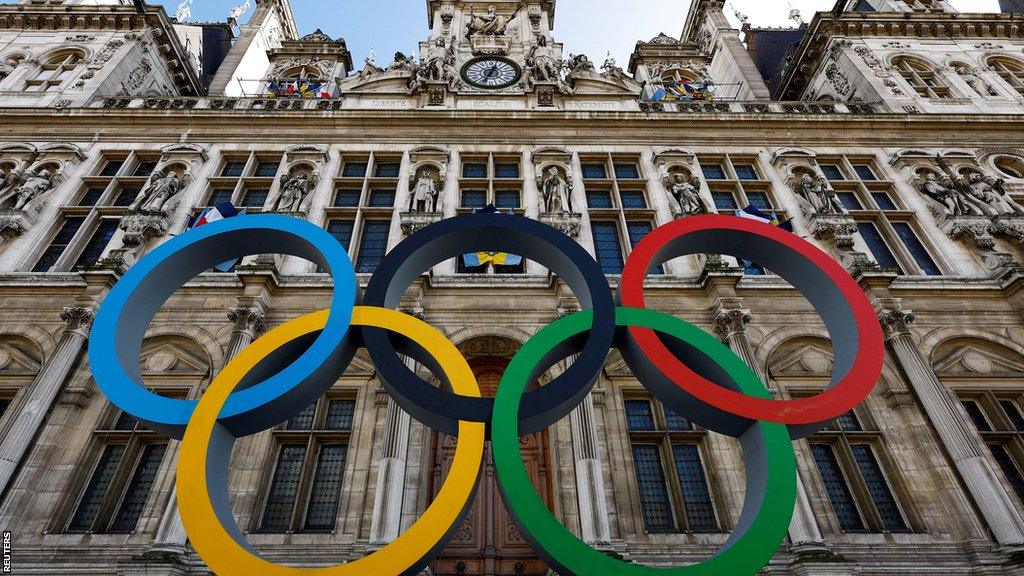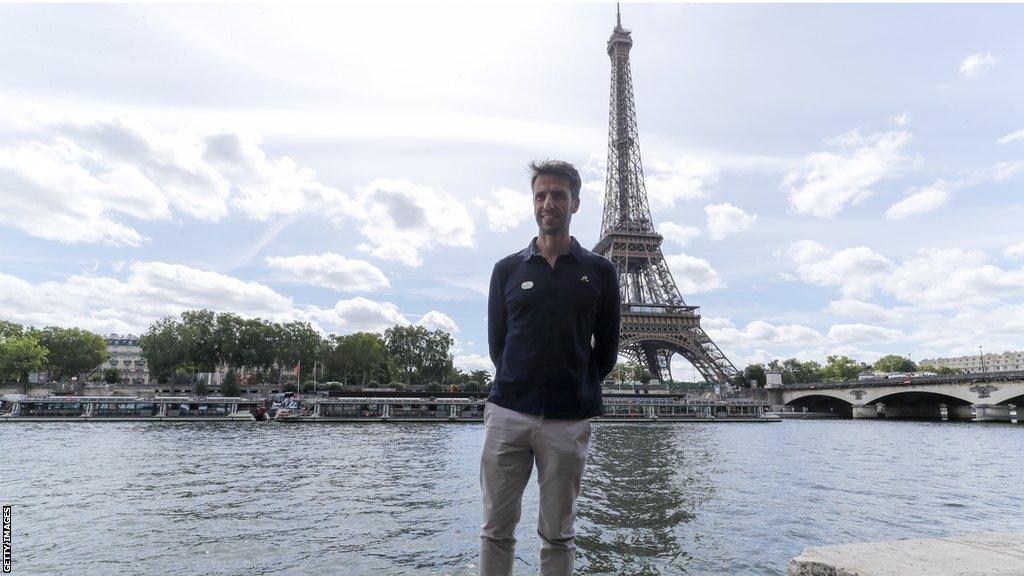Paris 2024 chief wants Olympics and Paralympics to be 'new model' of 'spectacular and sustainable'
- Published

The Olympic rings will be a common sight around Paris during the Games
Paris 2024 chief Tony Estanguet says he wants next year's event to be "a new model" for staging the Olympics.
Organisers want the Games to be "spectacular and sustainable".
Wednesday marks a year to go to the start of the Olympics and Estanguet says that Paris can show an example to the rest of the world.
"We want to demonstrate that Paris and France can deliver a Games in a different way than in the past," he told BBC Sport.
"We have to be engaged in a new model of delivering the Games."
The Olympics take place in the French capital from 26 July-11 August with the Paralympics to follow from 28 August-8 September.
Organisers have put sustainability at the forefront of their plans with a goal to have emissions 50% lower than the 2012 and 2016 Games.
They want to develop new ways of working and bring about a "new era in the organisation of the Olympic and Paralympic Games".
The Tokyo Olympics' post-Games sustainability report calculated that the event had a total carbon footprint of between 1.96 million and 2.42 million tonnes of carbon dioxide.
But it claimed the 2020 event (held in 2021 because of the Covid pandemic) went "beyond carbon neutrality" through a range of reduction and mitigation measures.
The report added that emissions were lower than they might otherwise have been by 800,000 tonnes of carbon dioxide because Covid-19 restrictions meant there were few fans in attendance.
"We have to change our habits," said Estanguet, a three-time Olympic canoe champion. "We have to change the way we decide to organise the games or World Championships or World Cups.
"Otherwise people will not accept different rules for major events and normal lives, so that is why we set the level of ambition very high in terms of sustainability and to deliver a message.
"We have plans for a fantastic celebration while also demonstrating that it is feasible to reduce the carbon footprint by half because otherwise the future of the Games will be in danger and we have to demonstrate it is possible to still deliver it."
The Games have made extensive use of existing and temporary facilities in Paris with only two building projects required - for the Athletes' Village and the Aquatics Centre.
The Village uses a variety of low carbon initiatives, including the use of sustainably sourced wood instead of steel for the building's structural frame, while the Aquatics Centre has a concave roof, lowering the space of the area that needs heating.
However, there has been criticism of the decision to hold the surfing competition in Tahiti - 9,760 miles (15,700km) and a 22-hour flight from the French capital.
The French overseas territory's Teahupo'o wave in the South Pacific was chosen in preference to beaches in south-west France and in Brittany.
"We want to be the first Games to be fully aligned with the Paris Agreement. In terms of climate ambitions, that is very important," said Georgina Grenon, Paris 2024's head of environmental excellence.
The agreement unites almost all the world's nations - for the first time - in a single aim to cut the greenhouse gas emissions that are causing global warming.
Agreements were made to "pursue efforts" to limit global temperature rises to 1.5C, and to keep them "well below" 2.0C above pre-industrial times.
"This was part of a different way of organising the Games to be more sustainable," Grenon added.
"The most important thing is to reduce emissions. We see the event as a laboratory for innovation for looking for solutions on how to reduce and then leave those reductions as a legacy.
"We are counting on everyone - athletes and spectators - to play their part.
Grenon said Paris 2024 will be the first games to use 100% renewable electricity, comparing it to the 4million litres of diesel London 2012 used to power generators. Three countries have already agreed to send their athlete delegations by train, the Netherlands, Belgium and Great Britain.

Estanguet believes Paris will be the perfect backdrop for a celebratory Games
Although there have been concerns around security in France after recent riots in the capital and incidents at the 2022 Champions League final, Estanguet says it remains his priority.
"It is the biggest system we have ever done in terms of security and is unprecedented so I want to trust the capacity and expertise," he said.
Estanguet and his team are also closely watching long-term weather models amid fears of high temperatures and are prepared to change event times if necessary.
On the possibility of Russian and Belarusian athletes taking part in the Games, he refused to be drawn.
Earlier this month, the International Olympic Committee (IOC) said that Russia and Belarus would not receive an invitation to compete at the Games while the International Paralympic Committee (IPC) will discuss the ongoing suspension of both countries at their General Assembly in Bahrain from 27-29 September.
"I strongly believe that we need to protect the universality of the games by having the IOC and IPC decide on whether those countries should participate," he said.
"As the Organising Committee we have to respect those decision and to welcome the athletes that would be qualified and authorised to participate in the Games."